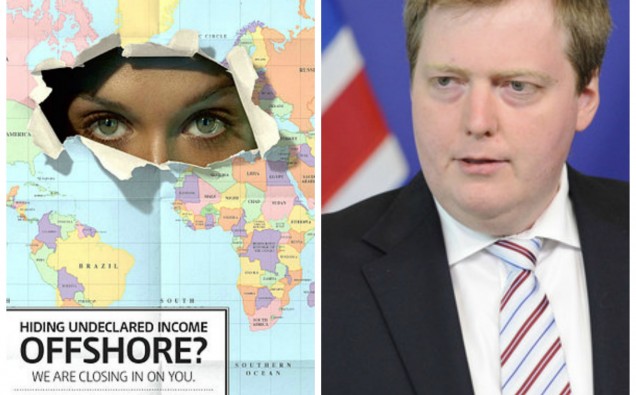
FEATURED IMAGE above shows Iceland PM and a British Poster on safe havens Photo via Wikimedia Commons
A mammoth data of more than 11 million documents – released from the leaked database of a Panama-based law firm – has claimed its first casualty – Sigmundur David Gunnlaugsson – the prime minister of Iceland, who resigned Tuesday in the wake of massive protests following reports of his links to offshore safe havens practices.
The revelation of names of individuals and companies linked to stashing wealth in offshore tax havens has led to a string of allegations of corruption against some known leaders, and Gunnlaugsson’s exit may further fuel and reverberate calls for exit of leaders, who conceal their wealth from public purview.
Billed as Panama Papers in the media around the globe, the disclosures have already touched off a stormy focus on the rich and powerful – although it has not been established yet whether investments, wealth accumulation or accounts violate financial or international laws.
Among implications stemming from revelations and media accounts has been a scrutiny of known politicians and rulers as some of them have long been accused of being synonymous with corruption, plunder and malpractices.
Analysts are debating what might happen to some of the other names linked to keeping their money in safe havens. The question facing political leaders and dictators would be how to control the damage, if people choose to demonstrate on streets and press for their ouster. Will the popular will prevail or a la Arab Spring reaction to people’s demands such as the one by Syrian autocrat Bashar al Assad engulf countries and nations in bloody conflicts? Fear and hope are treading side by side. In the Internet-assisted climate of democracy, the popular chorus of transparency means scrutiny and accountability. Challenge and opportunity go side by side.
HOW PNAMA LEAKS SWEPT GLOBAL MEDIA
German newspaper Sueddeutsche Zeitung was the first to get hold of the data of the Panamanian law firm Mossack Fonseca, one of the largest offshore law companies dealing with shell companies – from an anonymous source more than a year ago, and covers years between 1970s and Spring 2016.
According to CNBC, the data – shared by Sueddeutsche Zeitung with the International Consortium of Investigative Journalists and reporters of more than 100 news services – tells of links to 72 current or former heads of state, including autocrats and dictators. In a remarkable development for the international media, the newspapers and outlets made their reports public simultaneously.
An avalanche of articles and reports sourced from the leaked data in the media around the world links around 143 politician, members of their families and aides to the practice of concealing their wealth and avoiding taxes.
The reports by investigative journalists belonging to the Consortium reveals names of prominent personalities and their aides including Russian President Vladimir Putin, President Mauricio Macri of Argentina; Prime Minister Nawaz Sharif of Pakistan, Ukrainian President Petro Poronshenko; Saudi King Salman; former Middle Eastern dictators like Egypt’s former president Hosni Mubarak, Libya’s former leader Muammar Gaddafi, Syria’s president Bashar Assad, and Gulf rulers like former emir of Qatar, Hamad bin Khalifa al-Thani, and former prime minister, Hamad bin Jassim bin Jaber al-Thani. Some reports also name Argentine mega soccer star Lionel Messi.
IMPLICATIONS
Media accounts in some of the leading news organizations including the BBC suggest that the rich people used offshore bank accounts and services to hide their wealth and evade taxes.
But many prominent leaders have trashed allegations that they broke laws in transactions and saving their wealth.
In Pakistan, the family of billionaire prime minister Nawaz Sharif has denied any wrongdoing but revelation of his name has stimulated a probing debate in the national media.
In Iceland, thousands of protestors demanded ouster of prime minister.Gunnlaugsson following reports that associated him with an offshore company he established in the British Virgin Islands with a partner, whom he later married.
In Britain, prime minister David Cameron was under pressure to clarify his position on his deceased father Ian Cameron’s offshore investment fund, which according to reports, avoided tax payments in Britain.
![By JCRules (Own work) [CC BY-SA 4.0 (http://creativecommons.org/licenses/by-sa/4.0)], via Wikimedia Commons](https://www.viewsnews.net/wp-content/uploads/2016/04/Countries_implicated_in_the_Panama_Papers_svg-1-300x154.png)
By JCRules (Own work) [CC BY-SA 4.0 (http://creativecommons.org/licenses/by-sa/4.0)], via Wikimedia Commons
Meawnhile, Mossack Fonesca has declined to comment on specific matters after the leak but told the Guardian newspaper that it “can confirm the parties in many of the circumstances you cite are not and have never been clients of Mossack Fonseca”
“We have always complied with international protocols … to assure as is reasonably possible, that the companies we incorporate are not being used for tax evasion, money laundering, terrorist finance or other illicit purposes.”
Denying any violation of regulations, the law firm says its response should not be taken as a “validation of the information,” in leaked documents, and threatened to pursue a legal course.
“It appears that you have had unauthorized access to proprietary documents and information taken from our company and have presented and interpreted them out of context. We trust that you are fully aware that using information/documentation unlawfully obtained is a crime, and we will not hesitate to pursue all available criminal and civil remedies,” a statement sent to the Guardian said.
The New York Times, meanwhile, contemplating how may American might figure in the data, noted that there could be relatively few Americans is that “it is fairly easy” to form shell companies in the United States.
The newspaper cited James Henry, an economist and senior adviser to the Tax Justice Network, who told Fusioin that Americans “really don’t need to go to Panama.”
“Basically, we have an onshore haven industry in the U.S. that is as secretive as anywhere,” he said.











